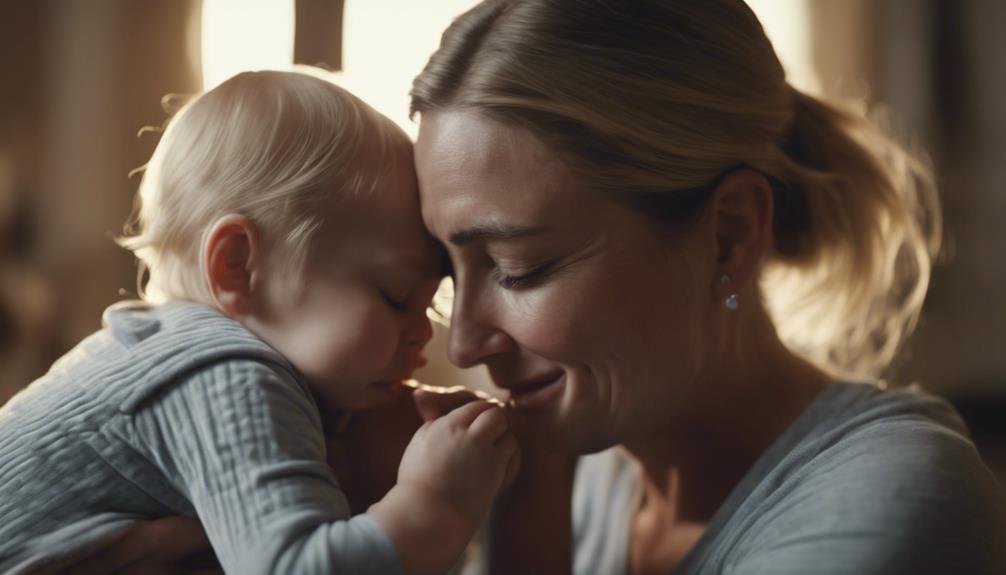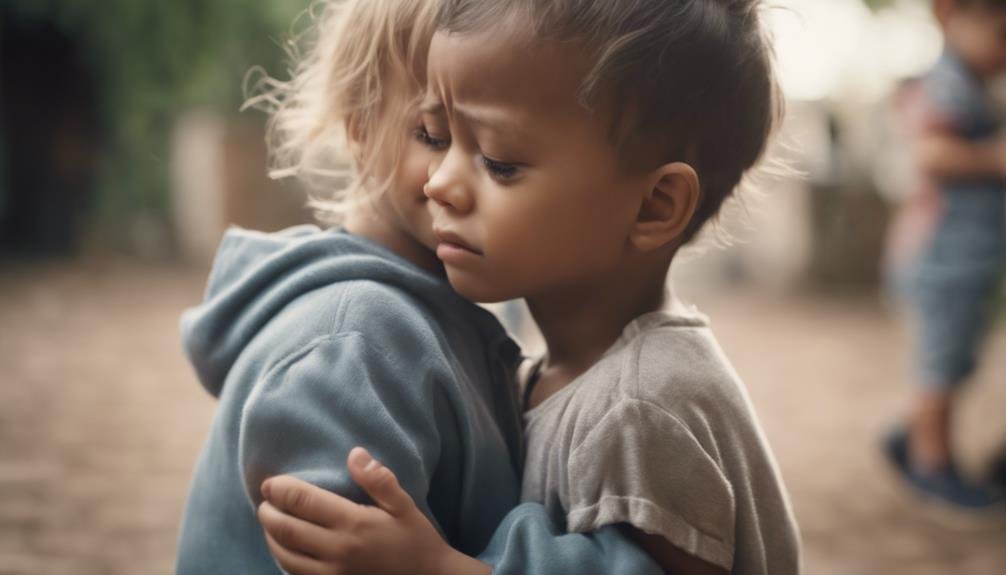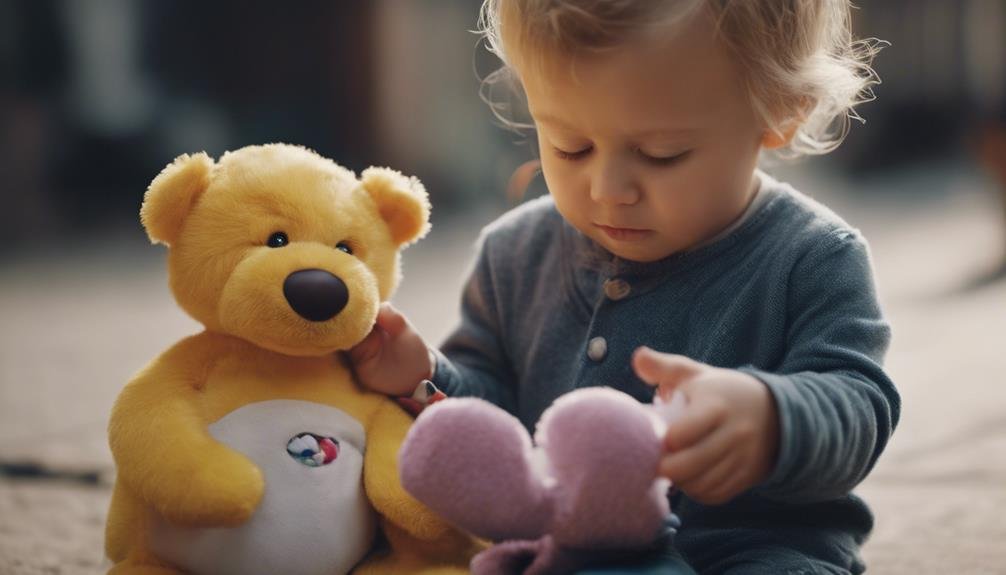To encourage empathy and kindness in toddlers, you must understand the significance of nurturing these traits from a young age. By modeling empathy in your own actions and interactions, you lay a crucial foundation for your child's development. However, there are other essential strategies that can further enhance your child's understanding of empathy and kindness. These methods encompass a range of activities and approaches that can shape your toddler's character positively. By incorporating these practices into your daily routine, you will be fostering an environment that cultivates empathy and kindness in your child.
Key Takeaways
- Demonstrate empathy consistently in daily interactions.
- Use interactive play activities to teach emotions.
- Read books about kindness to instill values.
- Encourage sharing and cooperation through actions.
- Practice gratitude together to foster kindness.
Setting a Positive Example

To encourage empathy and kindness in toddlers, it's essential that adults around them consistently demonstrate these values in their own actions and interactions. Children learn by observing the behavior of those around them, especially the adults they look up to. When you show empathy towards others in your daily interactions, whether it's comforting a friend or helping a neighbor, toddlers are more likely to mirror this behavior. Kindness can be as simple as saying 'please' and 'thank you' or offering a helping hand when needed.
Your actions speak louder than words. When you model empathy and kindness, you create a positive environment that encourages toddlers to do the same. Remember to be patient and understanding, especially when conflicts arise. Show them how to communicate effectively and resolve disagreements peacefully. By demonstrating these values consistently, you're laying the foundation for toddlers to grow into empathetic and kind individuals who positively contribute to society.
Teaching Emotions Through Play
Demonstrate the different emotions and reactions through interactive play activities with toddlers to help them understand and express their feelings effectively. Playing is a powerful tool for teaching children about emotions in a fun and engaging way.
Here are three ways you can incorporate emotional learning into playtime with toddlers:
- Emotion Charades: Encourage your toddler to act out different emotions like happiness, sadness, or excitement. Guessing the emotion and talking about why they feel that way can help them recognize and label their own feelings.
- Emotion Matching Games: Create simple matching games where toddlers match facial expressions to corresponding emotions. This activity can help them associate facial cues with different feelings, improving their emotional intelligence.
- Role-Playing Scenarios: Use dolls, stuffed animals, or action figures to act out scenarios that evoke various emotions. This allows toddlers to explore different reactions and responses in a safe and imaginative environment, fostering empathy and understanding of others' feelings.
Reading Books About Kindness

Exploring books that highlight kindness can foster empathy and compassion in toddlers from an early age. Reading stories that showcase acts of kindness helps children understand the importance of being caring and considerate towards others. Here are some recommended books that you can enjoy with your little ones:
| Title | Author |
|---|---|
| "The Giving Tree" | Shel Silverstein |
| "Kindness is my Superpower" | Alicia Ortego |
| "Last Stop on Market Street" | Matt de la Peña |
| "Each Kindness" | Jacqueline Woodson |
| "Have You Filled a Bucket Today?" | Carol McCloud |
These books not only entertain but also serve as valuable tools to instill values of kindness and empathy in your child. As you read these stories together, take the time to discuss the characters' actions and feelings, encouraging your toddler to empathize with them. By incorporating these books into your reading routine, you are nurturing the seeds of kindness and compassion in your child's heart.
Encouraging Sharing and Cooperation
As you continue nurturing empathy through reading, fostering a spirit of sharing and cooperation in toddlers is a natural progression towards developing their social skills. Encouraging sharing and cooperation at a young age helps toddlers understand the importance of considering others' needs and building positive relationships. Here are three effective ways to promote sharing and cooperation in toddlers:
- Lead by Example: Demonstrate sharing and cooperation in your own actions and interactions with your child and others. Children learn best through observation, so showing them how to share toys, take turns, and collaborate with others sets a strong foundation for their behavior.
- Use Positive Reinforcement: Praise and acknowledge your child's efforts when they share or cooperate with others. Positive reinforcement helps reinforce these behaviors, making children more likely to continue sharing and cooperating in the future.
- Provide Opportunities for Group Activities: Encourage group play and activities that require cooperation, such as building blocks together or playing simple team games. These experiences help children learn to work together, communicate effectively, and understand the joy of shared experiences.
Acknowledging Feelings Validity

To foster empathy and kindness in toddlers, it's essential to acknowledge the validity of their feelings. When your toddler expresses emotions, whether it's joy, frustration, or sadness, it's crucial to validate those feelings. By acknowledging their emotions, you're showing them that it's okay to feel the way they do and that their feelings are important.
As a parent or caregiver, you can validate your toddler's feelings by actively listening to them. When they share how they're feeling, respond with empathy and understanding. For example, if your toddler is upset because they can't have a toy, you can say, 'I understand that you're feeling frustrated because you really wanted that toy.' This simple act of validation helps your toddler feel heard and supported.
Practicing Gratitude Together
Let's embark on a journey of nurturing empathy and kindness in toddlers by engaging in the practice of gratitude together. Gratitude is a powerful tool that can help toddlers understand and appreciate the positive aspects of their lives, fostering kindness and empathy towards others.
Here are three ways you can practice gratitude with your little one:
- Gratitude Journal: Encourage your toddler to keep a simple gratitude journal where they can draw pictures or dictate things they're thankful for each day. This practice can help them focus on the good things in their lives.
- Gratitude Rituals: Establish bedtime or mealtime rituals where you both share what you're grateful for that day. This can create a sense of connection and help your toddler learn to express appreciation.
- Gratitude Walks: Take walks together and point out things in nature to be grateful for, such as the sunshine, flowers, or birds singing. This activity can instill a sense of awe and gratitude in your toddler's heart.
Engaging in Acts of Kindness

Engage your toddler in small acts of kindness towards others to cultivate a sense of compassion and generosity in their young hearts. By involving them in simple acts of kindness, you can teach them the value of empathy and encourage a mindset of helping those around them. Here are some ideas to get you started:
| Act of Kindness | How to Involve Your Toddler | Impact |
|---|---|---|
| Sharing toys with a friend | Encourage your toddler to offer a toy to a playmate | Teaches sharing and cooperation |
| Saying thank you | Prompt your toddler to express gratitude when given something | Cultivates appreciation and politeness |
| Helping with chores | Involve your toddler in simple household tasks | Instills a sense of responsibility and teamwork |
| Making a card for a relative | Guide your toddler in creating a personalized card for a family member | Fosters connections and shows thoughtfulness |
| Giving a hug | Encourage your toddler to hug a friend or family member | Demonstrates affection and care |
These small acts of kindness can have a big impact on your toddler's development, nurturing a kind and empathetic nature from a young age.
Using Positive Reinforcement
Encouraging toddlers through positive reinforcement can be a powerful way to promote desired behaviors and strengthen their sense of self-worth. Positive reinforcement involves acknowledging and rewarding good behavior, which can help toddlers understand what's expected of them and encourage them to continue those behaviors.
Here are three ways you can effectively use positive reinforcement with your toddler:
- Praise and Affection: Shower your toddler with praise, hugs, and affection when they demonstrate empathy and kindness towards others. Let them know how proud you're of their actions, reinforcing the idea that being kind is valuable.
- Reward Systems: Implement a simple reward system where your toddler can earn stickers, points, or small treats for acts of empathy and kindness. This can provide immediate positive feedback and motivation for them to continue their caring behaviors.
- Modeling Behavior: Be a role model for your toddler by demonstrating empathy and kindness in your own actions. Children often learn by example, so showing them how to be kind and empathetic in your interactions with others can have a profound impact on their behavior.
Discussing Impact of Actions

To help your toddler understand the impact of their actions, engage them in conversations that highlight how their kindness and empathy can make a difference in others' lives. Toddlers are naturally curious and open to learning, making it a perfect time to instill the values of empathy and kindness.
When you notice your toddler being kind or empathetic, take a moment to praise and acknowledge their actions. Explain to them how their behavior positively affects others, whether it's comforting a friend who's upset or sharing toys with a sibling. By discussing the impact of their actions in simple terms, you help them connect their behavior to real-world outcomes.
Encouraging your toddler to reflect on how their actions influence those around them fosters a sense of responsibility and awareness. As you engage in these conversations, be attentive and patient, allowing your child to express their thoughts and feelings. Through open dialogue, you create a safe space for your toddler to explore the significance of their actions and develop a deeper understanding of empathy and kindness.
Emphasizing Empathy in Conflict Resolution
In navigating conflicts with your toddler, prioritize understanding and showing empathy towards their feelings and perspectives. Conflict resolution is an essential skill that can be nurtured from a young age, shaping how your child interacts with others throughout their life.
Here are three ways to emphasize empathy in conflict resolution with your toddler:
- Active Listening: When conflicts arise, take the time to actively listen to your toddler's side of the story. Show genuine interest in understanding their feelings and perspective without judgment. Reflecting back what they say can help them feel heard and valued.
- Validate Emotions: Acknowledge and validate your toddler's emotions, even if you don't agree with their behavior. Let them know that it's okay to feel upset, frustrated, or angry. This validation can help them develop emotional intelligence and feel understood.
- Model Empathy: Be a role model for your toddler by demonstrating empathy in your own interactions. Show them how to consider others' feelings, perspectives, and needs when resolving conflicts. Your actions speak louder than words, and they'll learn best by observing how you navigate conflicts with empathy and kindness.
Frequently Asked Questions
How Can I Handle My Toddler's Aggressive Behavior Towards Others?
When your toddler displays aggression towards others, address the behavior calmly but firmly. Set clear boundaries, provide positive reinforcement for gentle actions, and model kindness yourself. Encourage empathy by helping them understand how their actions impact others.
What Role Does Self-Care Play in Fostering Empathy in Toddlers?
Take care of yourself, showing empathy and kindness. Toddlers learn from your example. By prioritizing self-care, you model behavior that fosters empathy in them. Your well-being directly impacts their emotional development.
Can Empathetic Behavior Be Taught Through Exposure to Diverse Cultures?
Exposing yourself to diverse cultures can broaden your perspective and understanding of others' experiences. This exposure can help you develop empathy by fostering a sense of connection and compassion towards people from different backgrounds.
Should I Address My Toddler's Negative Emotions or Actions in Public?
When addressing your toddler's negative emotions or actions in public, aim to handle the situation calmly and discreetly. Offer comfort, set boundaries, and redirect their behavior gently. Remember, your response teaches them how to manage emotions effectively.
What Are Some Creative Ways to Incorporate Empathy Into Daily Routines?
Incorporate empathy into daily routines by modeling kindness and discussing feelings openly. Encourage perspective-taking through storytelling or role-playing. Engage in acts of kindness together, reinforcing the value of empathy in your interactions.
Conclusion
In conclusion, by leading with empathy and kindness in your own actions and interactions, you can help toddlers learn these important values naturally.
Remember, actions speak louder than words, so continue to set a positive example and engage in activities that promote empathy and kindness.
By doing so, you'll be planting the seeds for a future filled with compassion and understanding.
After all, kindness is the key to unlocking hearts and building strong connections.




